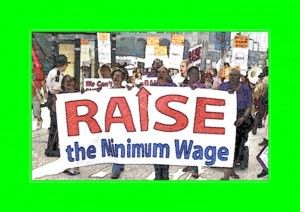New min wage law clears CA Senate committee
by James Poulos | March 31, 2014 3:44 pm
 [1]Two minimum wage hikes in two years for California? Just a year after Gov. Jerry Brown signed one minimum wage hike into law, the California Senate’s Labor and Industrial Relations Committee last week greenlit an even faster and more sweeping boost. Last year, Brown signed Assembly Bill 10[2], by Assemblyman Luis Alejo, D-Salinas, which boosted the state’s current $8 minimum wage this way:
[1]Two minimum wage hikes in two years for California? Just a year after Gov. Jerry Brown signed one minimum wage hike into law, the California Senate’s Labor and Industrial Relations Committee last week greenlit an even faster and more sweeping boost. Last year, Brown signed Assembly Bill 10[2], by Assemblyman Luis Alejo, D-Salinas, which boosted the state’s current $8 minimum wage this way:
- $9 on July 1, 2014
- $10 on Jan. 1, 2016
Now Senate Bill 935[3], by state Sen. Mark Leno, D-San Francisco, would go well beyond AB10. The new, faster progression would be:
- $9 on July 1, 2014 (from current law)
- $11 on Jan. 1, 2015
- $12 on Jan. 1, 2016
- $13 on Jan. 1, 2017
Beginning in 2018, the wage would be indexed to the U.S. Consumer Price Index in that and subsequent years. The increase would be $8 in early 2014 to $13 in 2017. The boost would be $5 an hour, or 63 percent.
High cost of living
Current data show that, for Californians, rent and the cost of living are near the top for the nation. According to a new report issued[4] by the National Low Income Housing Coalition, California is the second least affordable state in the nation for renters. That would seem to indicate that a higher minimum wage is necessary just to afford decent housing in California. However, NLIHC president Sheila Crowley claimed minimum-wage increases alone cannot make up for a lack of adequate affordable housing.
Opposition
As they have in the past, opponents of a higher minimum wage will point to a 2012 U.S. Census Bureau study, which found:
- “Minimum wage workers tend to be young. Although workers under age 25 represented only about one-fifth of hourly paid workers, they made up about half of those paid the Federal minimum wage or less. Among employed teenagers paid by the hour, about 21 percent earned the minimum wage or less, compared with about 3 percent of workers age 25 and over. (See table 1 and table 7.)….
- “The proportion of hourly paid workers earning the prevailing federal minimum wage or less declined from 5.2 percent in 2011 to 4.7 percent in 2012. This remains well below the figure of 13.4 percent in 1979, when data were first collected on a regular basis. (See table 10.)”
In short, few minimum-wage workers are heads-of-household supporting families by paying rent or a mortgage.
Brown
Brown also is unlikely to back Leno’s bill. Brown signed last year’s minimum wage increase only after[5] a cost-of-living section was removed by Alejo. Brown likely wouldn’t go for it this year. Brown also knows his Republican opponent in November will charge him with being anti-business. He wouldn’t want to confirm that charge by backing Leno’s much higher minimum wage boost.
Obama
President Obama also has been pushing for a higher minimum wage. The current federal minimum wage is $7.25. In January, he signed[6] a controversial executive order raising that to $10.10 — but only for federal workers. He also called for a similar hike for all U.S. workers. However, the Republican majority in the U.S. House of Representatives is highly unlikely to back such an increase.
Unz initiative
Back in California, a lack of momentum scuttled tech entrepreneur Ron Unz’s attempt to get his own $12 an hour minimum wage initiative on the ballot this year. Blaming disinterest from unions and fellow conservatives alike, Unz insisted a higher in-state minimum wage would still help address national immigration and Social Security challenges. In California, however, the political battle lines make it hard for an unorthodox approach like Unz’s to swing influential figures or ordinary voters. On SB935, attention now turns to the full Senate.
- [Image]: http://calwatchdog.com/wp-content/uploads/2014/03/Raise-the-Min-Wage-sketch.jpg
- Assembly Bill 10: https://leginfo.legislature.ca.gov/faces/billNavClient.xhtml?bill_id=201320140AB10
- Senate Bill 935: http://blogs.sacbee.com/capitolalertlatest/2014/03/california-minimum-wage-hike-clears-first-senate-hurdle.html
- issued: http://www.latimes.com/business/money/la-fi-mo-california-rent-20140324,0,3714931.story#axzz2xWEQIUiL
- only after: http://www.sacbee.com/2013/09/12/5728922/jerry-brown-lawmakers-poised-to.html
- signed: http://www.foxnews.com/politics/2014/01/28/obama-to-raise-federal-minimum-wage-in-executive-action-tied-to-state-union/
Source URL: https://calwatchdog.com/2014/03/31/new-min-wage-law-clears-ca-senate-committee/